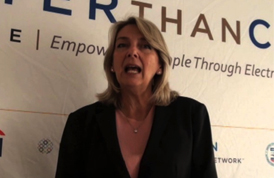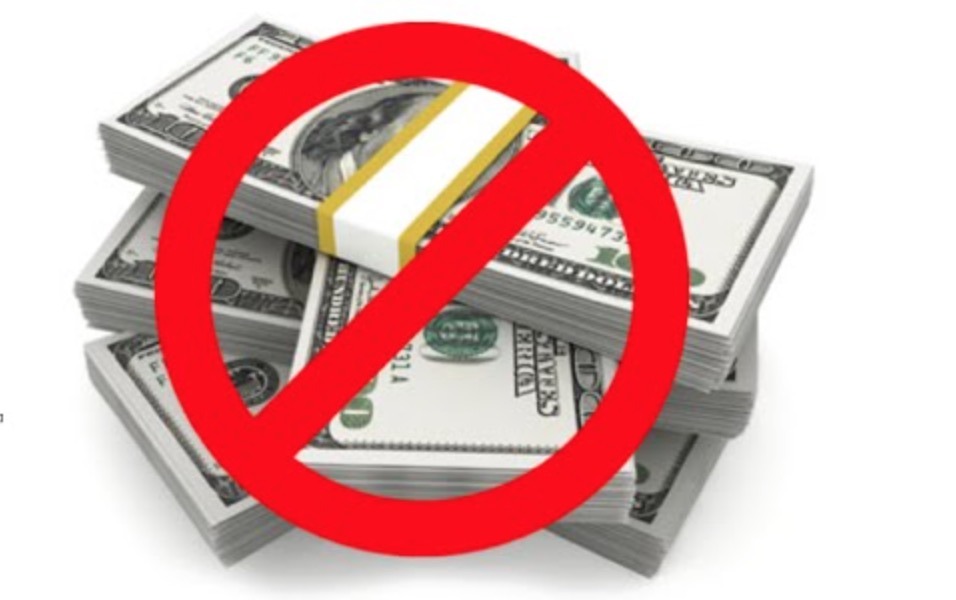Home » Posts tagged 'cashless society' (Page 8)
Tag Archives: cashless society
The War On Cash: Officially Sanctioned Theft
The War On Cash: Officially Sanctioned Theft
You’ve probably read that there is a “war on cash” being waged on various fronts around the world. What exactly does a “war on cash” mean?
It means governments are limiting the use of cash and a variety of official-mouthpiece economists are calling for the outright abolition of cash. Authorities are both restricting the amount of cash that can be withdrawn from banks, and limiting what can be purchased with cash.
These limits are broadly called capital controls.
The War On Cash: Why Now?
Why are governments suddenly acting as if cash money is a bad thing that must be severely limited or eliminated?
Before we get to that, let’s distinguish between physical cash—currency and coins in your possession—and digital cash in the bank. The difference is self-evident: cash in hand cannot be confiscated by a “bail-in” (i.e. officially sanctioned theft) in which the government or bank expropriates a percentage of cash deposited in the bank. Cash in hand cannot be chipped away by negative interest rates or fees like cash held in a bank.
Cash in the bank cannot be withdrawn in a financial emergency that shutters the banks, i.e. a bank holiday.
When pundits suggest cash is “obsolete,” they mean physical paper money and coins, not cash in a bank. Cash in the bank is perfectly fine with the government and its well-paid yes-men (paging Mr. Rogoff and Mr. Buiter) because this cash can be expropriated by either “bail-ins” or by negative interest rates.
Mr. Buiter, for example, recently opined that the spot of bother in 2008-09 (the Global Financial Meltdown) could have been avoided if banks had only charged a 6% negative interest rate on cash: in effect, taking 6% of the depositor’s cash to force everyone to spend what cash they might have.
…click on the above link to read the rest of the article…
The European “Template” For Dealing With Crises: Freezing Accounts, Bank Holidays, and Capital Controls…
The European “Template” For Dealing With Crises: Freezing Accounts, Bank Holidays, and Capital Controls…
More and more analysts are beginning to take note of the “War on Cash.” However, they’re missing the fact that the actual template for what’s coming to the US first appeared in Europe back in 2012.
Back in March of 2012, when the EU Crisis first began to spin out of control, then Prime Minister of France Nicolas Sarkozy openly called for the renegotiation of the Schengen Treaty: the treaty that established the 26-nation EU as a “borderless” entity in which individuals could move from one country to another with little difficulty and which also made trade among EU members easier.
France was not alone either. A few months later, both France and Germany proposed imposing border controls in June of that same year.
A Vote of No Confidence in Europe
Germany and France’s joint proposal to allow Schengen-zone countries to temporarily reintroduce border controls as a means of last resort might sound harmless. But doing so would damage one of the strongest symbols of European unity and perhaps even contribute to the EU’s demise.
Germany and France are serious this time. During next week’s meeting of European Union interior ministers, the two countries plan to start a discussion about reintroducing national border controls within the Schengen zone. According to the German daily Süddeutsche Zeitung, German Interior Minister Hans-Peter Friedrich and his French counterpart, Claude Guéant, have formulated a letter to their colleagues in which they call for governments to once again be allowed to control their borders as “an ultima ratio” — that is, measure of last resort — “and for a limited period of time.” They reportedly go on to recommend 30-days for the period.
…click on the above link to read the rest of the article…
The “Better Than Cash Alliance” Has an Orwellian Plan
The “Better Than Cash Alliance” Has an Orwellian Plan
In the fall of 1910, under the pretense of a duck hunting trip, a group of powerful bankers, political figures, and businessmen met secretly at Jekyll Island, Georgia, to plan the creation of a central bank for the United States.
The “game” that this elite group of “hunters” brought back to their ivory towers of Lower Manhattan and Capitol Hill was the blueprint for one of the most destructive financial institutions in modern history, theFederal Reserve.
One-hundred years later, another group of powerful bankers, political figures, and businessmen have converged to promote a cashless society.
 Ruth Goodwin-Groen, Director of the
Ruth Goodwin-Groen, Director of the“Better Than Cash Alliance”
Their ultimate aim: an economic system that would compel every man, woman, and child to utilize corporate, government-monitored electronic systems to make purchases of any kind.
The diabolically named Better Than Cash Alliance is as dangerous as the group of “outdoor enthusiasts” that met at Jekyll Island.
The Jekyll Island group sold their grand plans based on lies (they claimed that the Fed would protect the value of the currency, foster full employment, and guarantee liquidity in times of financial panics). And the Better Than Cash Alliance (BTCA) is promoting the notion of a cashless society based on the farce that eliminating cash would stimulate entrepreneurship among the poor.

Among the problems that come with the elimination of cash, the BTCA would reduce a great many opportunities for entrepreneurship for people of few means.
Gone would be the informal businesses the working poor often operate: roadside produce stands, street performances, handicraft tables, and day labor. Contrary to the assertions of the BTCA, a cash-free society would limit entrepreneurship to those with the means to incorporate a business, afford the proprietary system required to accept electronic payments, and understand the local, state, and federal tax burden the payment system may create.
…click on the above link to read the rest of the article…
Martin Armstrong Reports on a Secret Meeting in London to Ban Cash
Martin Armstrong Reports on a Secret Meeting in London to Ban Cash

At this point, anyone paying even the slightest bit of attention to the central planning economic totalitarians running the fraudulent global financial system is aware of the blatant push in the media to acclimate the masses to accepting a “cashless society.”
In the mind of an economic tyrant, banning cash represents the holy grail. Forcing the plebs onto a system of digital fiat currency transactions offers total control via a seamless tracking of all transactions in the economy, and the ability to block payments if an uppity citizen dares get out of line.
While we’ve all seen the idiotic arguments for banning cash, i.e., it will allow central planners to more efficiently centrally plan economies into the ground, Martin Armstrong is reporting on a secret meeting in London with the aim of getting rid of any economic privacy that remains by ending cash.
From Armstrong Economics:
I find it extremely perplexing that I have been the only one to report that there is a secret meeting in London where Kenneth Rogoff of Harvard University and Willem Butler the chief economist at Citigroup will address the central banks and advocate the elimination of all cash to bring to fruition the day when you cannot buy or sell anything without government approval. When I Googled the issue to see who has picked it up yet, to my surprise Armstrong Economics comes up first. Others are quoting me, and I even find it spreading as the Central Bank of Nigeria, but I have yet to find reports on the meeting taking place in London when my sources are direct.
Other newspapers who have covered my European tour have stated that the “crash” of which I speak is the typical stock market rather than in government. What is concerning me is the silence on this meeting where there are more and more reports about a cashless society would be better.
…click on the above link to read the rest of the article…
Why The Powers That Be Are Pushing A Cashless Society
Why The Powers That Be Are Pushing A Cashless Society
We Can’t Rein In the Banks If We Can’t Pull Our Money Out of Them
Martin Armstrong summarizes the headway being made to ban cash, and argues that the goal of those pushing a cashless society is to prevent bank runs … and increase their control:
The central banks are … planning drastic restrictions on cash itself. They see moving to electronic money will first eliminate the underground economy, but secondly, they believe it will even prevent a banking crisis. This idea of eliminating cash was first floated as the normal trial balloon to see how the people take it. It was first launched by Kenneth Rogoff of Harvard University and Willem Buiter, the chief economist at Citigroup. Their claims have been widely hailed and their papers are now the foundation for the new age of Economic Totalitarianism that confronts us. Rogoff and Buiter have laid the ground work for the end of much of our freedom and will one day will be considered the new Marx with hindsight. They sit in their lofty offices but do not have real world practical experience beyond theory. Considerations of their arguments have shown how governments can seize all economic power are destroy cash in the process eliminating all rights. Physical paper money provides the check against negative interest rates for if they become too great, people will simply withdraw their funds and hoard cash. Furthermore, paper currency allows for bank runs. Eliminate paper currency and what you end up with is the elimination of the ability to demand to withdraw funds from a bank.
…click on the above link to read the rest of the article…
The War on Cash: Transparently Totalitarian
The War on Cash: Transparently Totalitarian
George Orwell once wrote “If you want a picture of the future, imagine a boot stamping on a human face—forever.”
Not exactly a cheery thought, and one I don’t agree with.
While the forces pushing for centralization of power have been prevailing for decades, they haven’t won a total victory yet. Technologies that empower the individual and that tend toward decentralization—including the Internet, encryption, 3D printing, and cryptocurrencies—offer a powerful ray of hope, reasons to be optimistic about the future.
So the tug of war between the collectivists and the rest of us continues.
One thing that would tip the scales heavily in favor of the collectivists would be victory in the War on Cash. Their goal is to eliminate the use of hand-to-hand currency, so that governments can document, control, and tax everything.
It’s exactly like what Ron Paul said: “The cashless society is the IRS’s dream: total knowledge of, and control over, the finances of every single American.”
One way they are waging the War on Cash is to lower the threshold at which reporting a cash transaction is mandatory or at which paying in cash is simply illegal. In just the last few years…
- Italy made cash transactions over €1,000 illegal;
- Switzerland has proposed banning cash payments in excess of 100,000 francs;
- Russia banned cash transactions over $10,000;
- Spain banned cash transactions over €2,500;
- Mexico made cash payments of more than 200,000 pesos illegal;
- Uruguay banned cash transactions over $5,000; and
- France made cash transactions over €1,000 illegal, down from the previous limit of €3,000.
I recently spoke about this with Dr. Joe Salerno, an Austrian economist with the Mises Institute. Joe is the best chronicler of the global War on Cash and is here to offer an Austrian rebuttal to the economic nonsense peddled by advocates of this war.
…click on the above link to read the rest of the article…
Prove You’re Not a Terrorist
Prove You’re Not a Terrorist
Recently, France decided to crack down on those people who make cash payments and withdrawals and who hold small bank accounts. The reason given was, not surprisingly, to “fight terrorism,” the handy catchall justification for any new restriction governments wish to impose on their citizens. French Finance Minister Michel Sapin stated at the time, “[T]errorism feeds on fraud, money laundering, and petty trafficking.”
And so, in future, people in France will not be allowed to make cash payments exceeding €1,000 (down from €3,000). Additionally, cash deposits and withdrawals totaling more than €10,000 per month will be reported to Tracfin—an anti-fraud and money laundering agency.
Currency exchange will also be further restricted. Anyone changing over €1,000 to another currency (down from €8,000) will be required to show an identity card.
Do you need to make a deposit on a car? That might be suspect. Did you just deposit a dividend you received? It might be a payment from a terrorist organisation. Planning a holiday and need some cash? You might need to be investigated for terrorism.
And France is not alone. In the US, federal law requires banks to file a “suspicious activity report” (SAR) on their customers whenever a customer requests a suspicious transaction. (In 2013, 1.6 million SAR’s were submitted.)
As to what may be deemed “suspicious,” it may be any transaction of $5,000 or more, but it may also mean a series of transactions that, together, exceed $5,000.
…click on the above link to read the rest of the article…
The “War on Cash” in 10 Spine-Chilling Quotes
The “War on Cash” in 10 Spine-Chilling Quotes
The war on cash is escalating. As Mises’ Jo Salerno reports, the latest combatant to join the fray is JP Morgan Chase, the largest bank in the U.S., which recently enacted a policy restricting the use of cash in selected markets; bans cash payments for credit cards, mortgages, and auto loans; and disallows the storage of “any cash or coins” in safe deposit boxes. In other words, the war has moved on from one of words to actions.
Here are nine quotes that should chill the spine of any individual who cherishes his or her freedom and anonymity:
1. Kenneth Rogoff (from the intro to his paper The Costs and Benefits to Phasing Out Paper Currency):
Despite advances in transactions technologies, paper currency still constitutes a notable percentage of the money supply in most countries… Yet, it has important drawbacks. First, it can help facilitate activity in the underground (tax-evading) and illegal economy. Second, its existence creates the artifact of the zero bound on the nominal interest rate.
In other words, cash (not money) is the source of all evil and must be destroyed because governments can’t trace its every movement, and it represents a limiting factor on central banks’ ability to continue their insane negative-interest-rate experiment.
2. Citigroup’s Chief Economist Willem Buiter responds to the monetary economist Charles Goodhart’s description of abolishing currency as “shockingly illiberal.”
(T)his cost has to be seen against the cost that the anonymity of currency presents to society. Even though hard evidence is hard to come by, it is very likely that the underground economy and the criminal community are among the heaviest users of currency.
This, I believe, is the hidden intent behind all the excited talk about banning cash: to do away with the personal anonymity it offers.
…click on the above link to read the rest of the article…
Farewell to cash? Expect it to be a very long goodbye: Don Pittis – Business – CBC News
Farewell to cash? Expect it to be a very long goodbye: Don Pittis – Business – CBC News.
An Apple Pay rival created by a Canadian company means that the technology for a secure cashless society is only a heartbeat away, but the question is whether you will be willing to give up all your dollar bills in exchange.
Bionym’s new device, tuned to your individual heart rhythm, is being rolled out with the support of Royal Bank. It’s a wristband called Nymi, and it sounds like a real contender to make you feel safe about using electronic money.
- Royal bank to test out Toronto company’s Nymi technology
- Apple Pay not expected in Canada any time soon
- Tech trends for 2014: wearables, phablets and e-visits
The Nymi concept is fabulous. Royal Bank gets a lot of points for investing in an innovative cashless experiment. The system combines the two rising technologies of wearable computing and biometricauthentication.
But rather than using voice prints, fingerprints or retina scans, Nymi uses the unique pattern of your heartbeat as measured by a small wristband. Royal Bank is getting 250 people to try it tomake sure the system works in practice, with the eventual plan of offering it to all Canadians.
…click on the above link to read the rest of the article…



